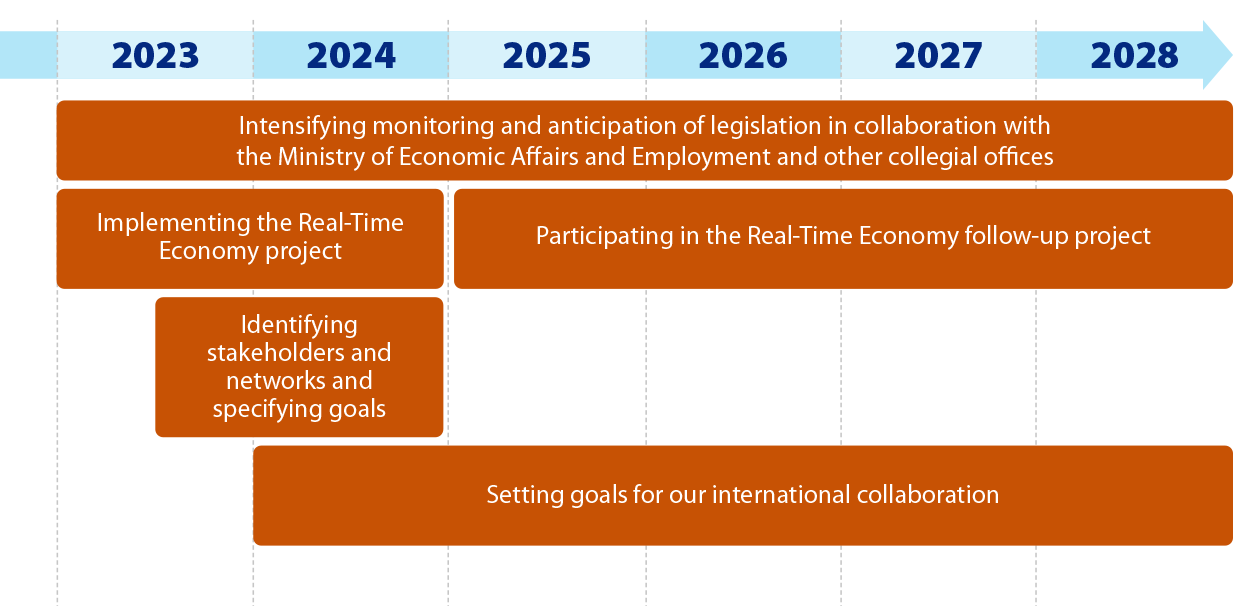Development programmes help us achieve our strategic goals
We have prepared development programmes to support our strategy. The programmes include several projects and other measures to help us achieve our strategic goals.
A brief description of their contents:
Programme: Customer-oriented services and operating culture
Strategic goal: Working for the customer
Our customers have been satisfied with our services for some time, since our customers' needs guide our work and the development of it.
A maturity model for measuring our customer orientation creates an overall picture of how customer orientated we really are and assists us to direct our development work to the areas and functions that need improvement.
It is necessary to determine our service levels and times in order to smoothly link our services to other public and private services.
Renewing our websites prh.fi and ytj.fi and extending our chatbot service helps us to provide more effective and active customer service.
The development programme includes the following measures:
- In spring 2023, we began to renew our websites prh.fi and ytj.fi. The project will be finalised at the end of 2026.
- During 2023, we will introduce a maturity model for customer orientation.
- The goal is to determine service times for our systems by spring 2024 and to implement them during 2025.
- In 2024, we will launch a project on digital customer advisory service. We will continue to develop the functions and the field of knowledge of our chatbot service. The chatbot is also used in voice recognition. The project allows us to examine the possibilities of using other digital tools and gradually start using them in our customer service. The project ends in spring 2027.
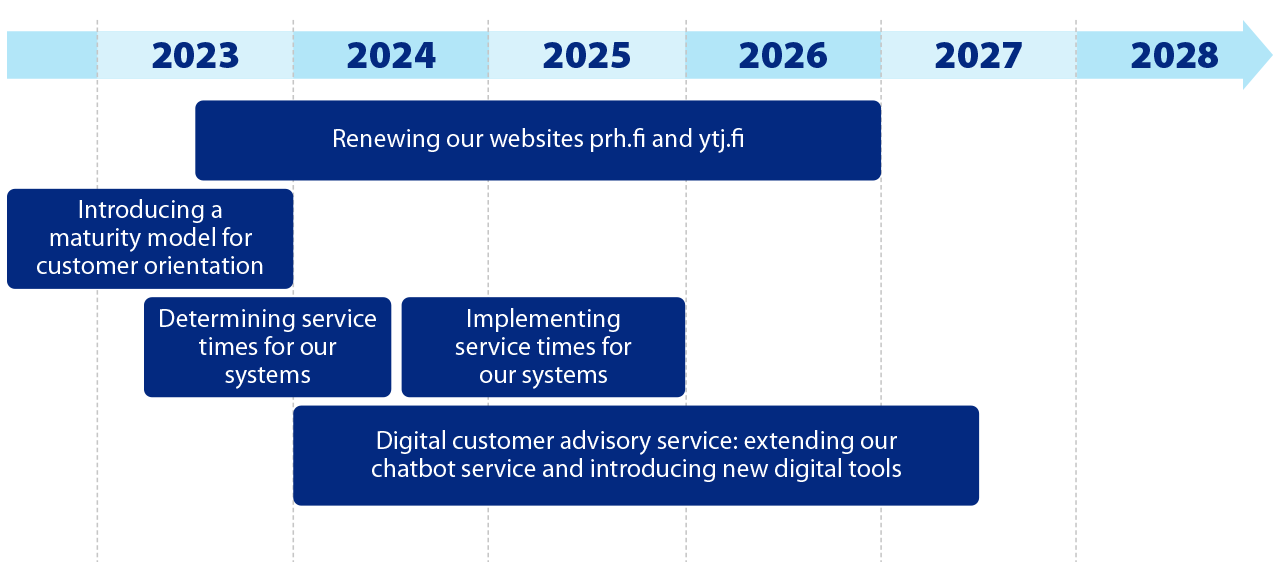
Programme: Activities and value creation based on data
Strategic goal: Our data are useful
The quality of the data we produce forms an important part of the value we create for our customers and society. Our data are increasingly and largely used. In addition to a clear data architecture, it is important to be able to describe and measure the quality of data better than before.
Knowledge-based management refers to making decisions based on current and high-quality data, which requires suitable tools. In order to use the data in our information systems more efficiently, we are introducing a user-friendly Business Intelligence system.
Better knowledge management reduces our dependence on the competence and knowledge of individuals. We can broaden our skills and abilities when knowledge management becomes a part of our processes and systems and data is systematically managed.
The development programme includes the following measures:
- From 2023 to 2026, we will prepare “product descriptions” of our data, where we explain what kind of data we publish.
- From 2023 to 2027, we will create a data management model, target levels for it, and monitor the quality.
- In autumn 2023, we will begin to prepare the purchase and introduction of the Business Intelligence (BI) system. Starting from 2026, we begin to develop the system.
- From spring 2024, we will develop our analytical knowledge.
- From 2024 to spring 2026, we will develop our systematic knowledge management. From spring 2026, we will continue to develop our knowledge management so that it will be included in our normal working routines.
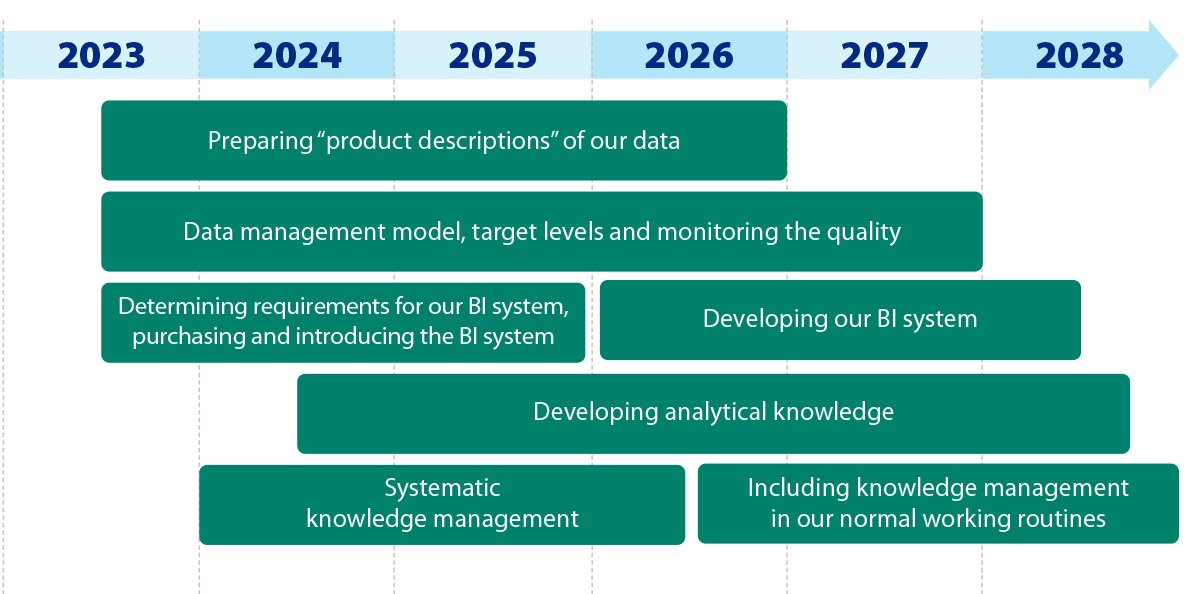
Programme: Continuous development of activities and operating practices
Strategic goal: We advance and develop
Our activities are based on information systems, so maintenance and development of our ICT systems is a key factor for us to succeed in our basic tasks. In order to ensure accurate situational awareness and a sensible use of different goals and limited resources, we will introduce a jointly managed development model.
In addition, needs-oriented total architectural work will support the development. Technology tests will enable us to ensure the smooth use of new technologies.
We have extensive experience in using Lean methods to support continuous improvement. We will continue developing the skills of Lean masters and use their extensive experience to lay the foundation for developing our activities and sharing best practices.
We want to be a responsible employer and an “authority citizen”. We will consolidate our corporate responsibility work by specifying corporate responsibility goals for 2023–2026.
The development programmes include the following measures:
- From 2023 to 2024, we will develop and harmonise our total architecture. In 2025–2027, we will promote our goal that online service is the best way to do business with us.
- From 2023 until the end of 2025, we will go through and document our processes so that they will be as compatible and clear as possible.
- From 2023 to 2024, we will develop our corporate responsibility work. In 2025–2027, we will continue to develop our corporate responsibility work and include it in our employees’ routines.
- From 2023, we will increase the number of technology tests, continue using Lean thinking systematically and strengthen our ability to change.
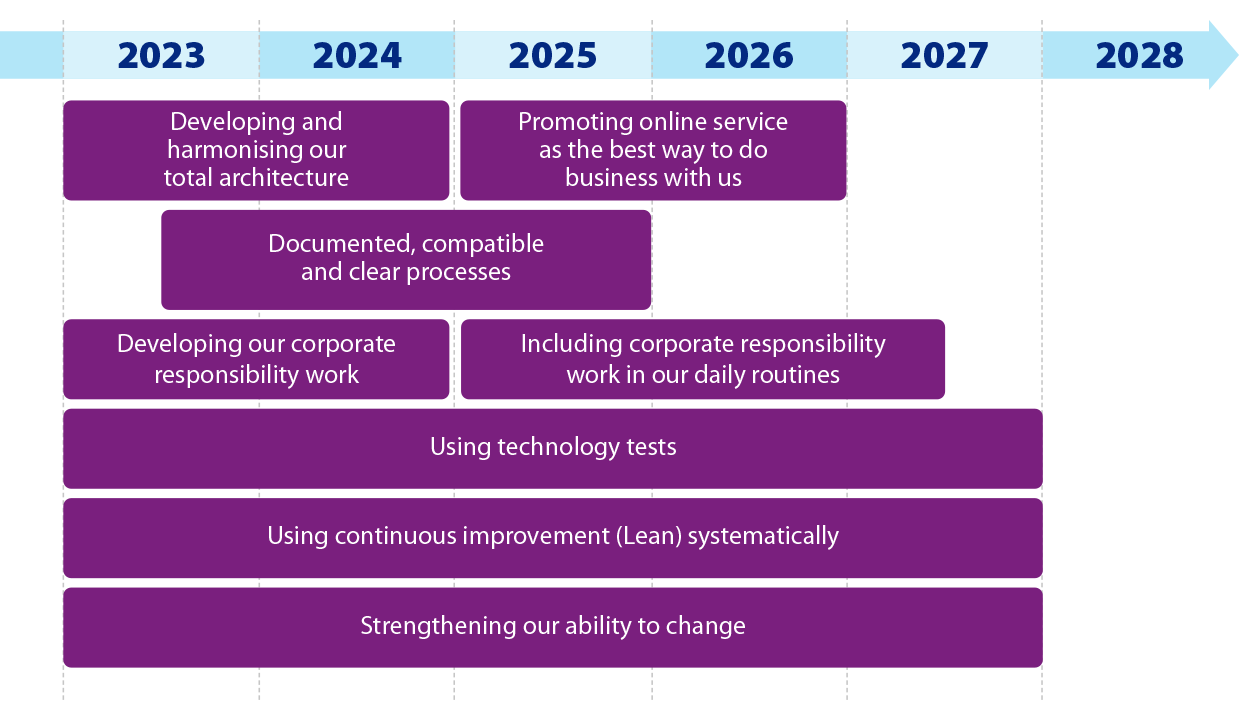
Programme: Skilled staff with high well-being
Strategic goal: We are a popular employer
We want to be an exemplary employer. Competition for skilled labour has become increasingly intense.
To draw up an internal and external employer image helps us to cherish well-being at work and improve our reputation as an employer. By determining strategic abilities, we are supporting recruitment and the development of skills. The competence path model will strengthen advancement at work.
Staff turnover has increased, which also provides a chance for renewal.
In the last few years, the recruitment procedure has changed as new requirements have been added, which have led to slower recruitment. Therefore, it is important to make the recruitment procedure more effective.
The development programme includes the following measures:
- From 2023 to spring 2024, we will specify our strategic abilities. From autumn 2024, we will regularly examine our abilities as a part of our operating environment analysis and operational plan.
- From 2023 to 2025, we will make our recruitment procedure more effective.
- From spring 2023 until the end of 2025, we will prepare ourselves for a new multi-location working environment.
- From autumn 2023 to spring 2024, we will analyse what kind of employer image our staff has of the PRH. In 2025, we will begin a project for establishing an internal and external employer image.
- From autumn 2024 to the end of 2026, we will create a competence path model for our staff.
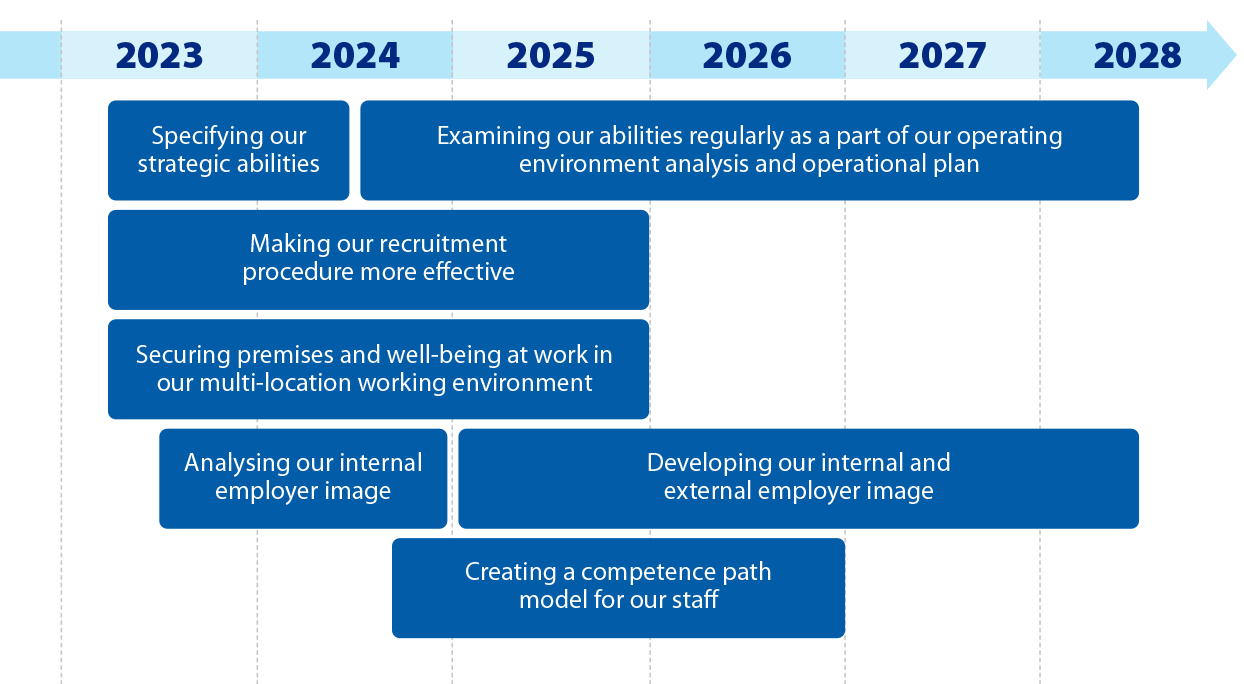
Programme: A proactive and networked PRH
Strategic goal: We act in networks
We participate in several networks, many of which are necessary for us to fulfil our task. The networks are also an important instrument for anticipating changes in our operating environment, acquiring information and influencing. In this way, we can offer our customers better service in different service chains.
An updated report of our stakeholders helps us to create a big picture of the scope of our network activities and set long-term goals.
In addition to the report, we will develop our activities in two special fields: We will intensify monitoring legislation and try influencing it through a coordination group for legislation. In addition, we will set clear activity-specific goals for international action and cooperation.
The development programme includes the following measures:
- In 2023, we will intensify the monitoring and anticipation of legislation in collaboration with the Ministry of Economic Affairs and Employment and other collegial offices.
- The Real-Time Economy project will run until the end of 2024. From 2025, we will take part in the Real-Time Economy follow-up project.
- From autumn 2023 until the end of 2024, we will identify our stakeholders and networks and specify the goals for the work with our stakeholders.
- From 2024, we will set the goals for our international collaboration.
